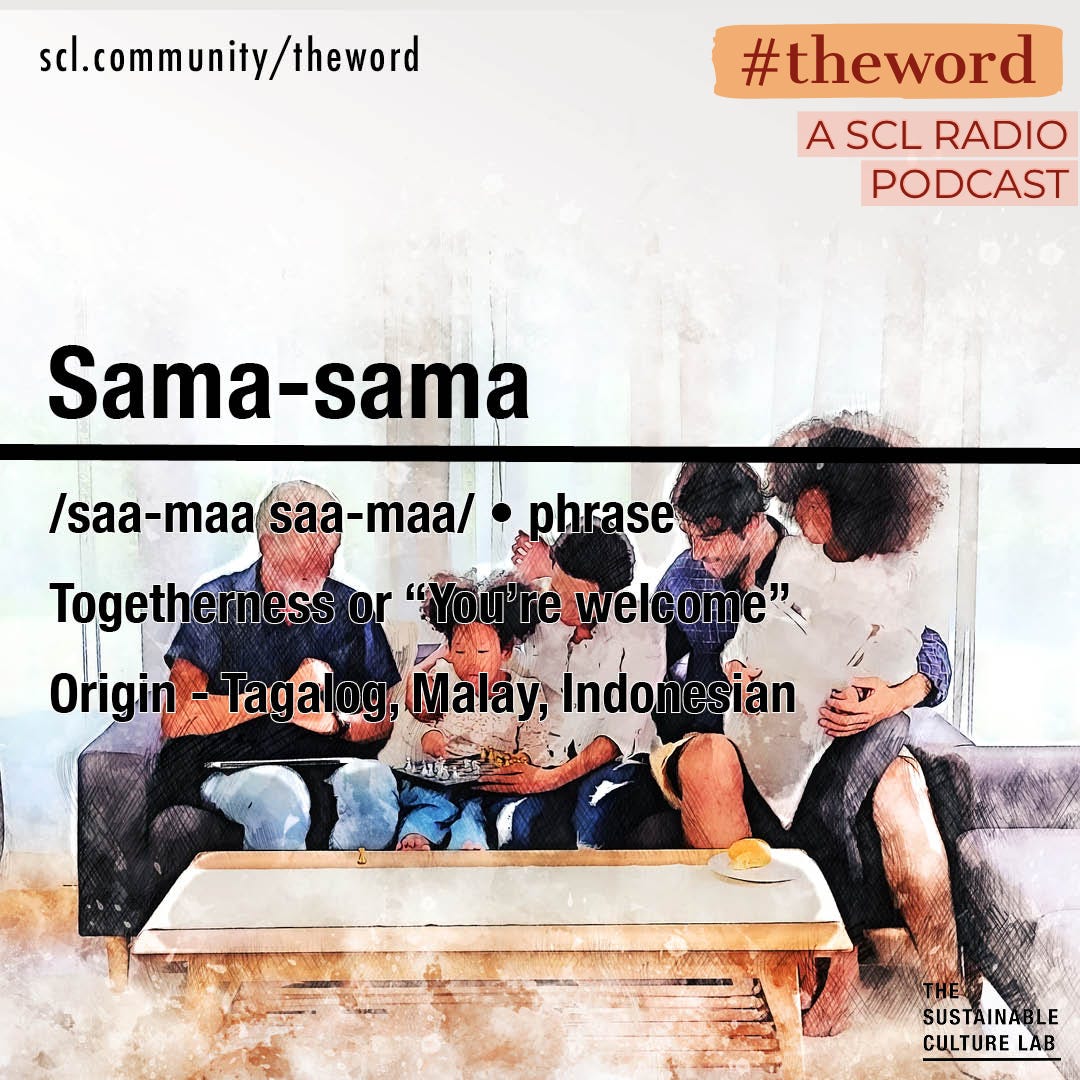Sama-sama • (saa-maa saa-maa) • phrase
Definition: Togetherness or “You’re welcome”
Origin: Tagalog, Malay, Indonesian
Earlier this year, SCL collaborated with SAMASAMA to produce “Diaspora People’s History Month” and we learned about “sama-sama.” The word “sama” means “same” in Tagalog, Malay, and Indonesian, but rather than just meaning “same-same” in those three languages, “sama-sama” has two different meanings which I found to be relevant during this time of year.
In Tagalog, which is spoken in the Philippines, sama-sama means “all together” or “togetherness” but in Malay, which is spoken in Malaysia, and Indonesian, it is used in place of “you’re welcome.” In Tagalog, sameness or shared humanity encourages people to articulate their togetherness. Sama-sama is a common and casual phrase in tagalog that people say all the time. It is both a noun and adjective and is used for being together and expressing togetherness, and each time they say “sama-sama” they articulate our shared humanity.In the sense of togetherness, SAMASAMA removed the hyphen and made the two words into one.
In Malay and Indonesian, people say sama-sama after someone has just given thanks, so rather than saying “you’re welcome,” they say “same-same,” which subconsciously generates a feeling of community. Imagine someone thanking you for your help and you replying with “same-same,” and when you thank someone else for their support, they also say “same-same.” Giving thanks and “sama-sama” are expressions of daily interconnectedness.
Sameness & Christmas
COVID-19 has made it difficult for family and friends to gather for the holidays, but the existential crisis of a deadly pandemic has helped remind so many of us about the importance of being together. This forced separation has made us recognize that being together, or being the “same,” is a key part of existence that we cannot neglect.
During this month, I also noticed how the news hardly spoke about a “war on Christmas.”
As America confronted an existential crisis, we had less time to fabricate an essentialist crisis around Christmas. The petty disputes and divisive rhetoric had been replaced with the universal desire to commune with our friends and family. Existence preceded essence this year, and we could focus on what truly matters. Hopefully, our prioritization of existence and togetherness will continue in the years to come without the need of a deadly pandemic.
As we spend time giving thanks with our friends and family this holiday season, we should also remember to spend time celebrating and embracing our shared humanity and sameness.
Same-same vs. American Individualism
As we know, ethnocide depends on creating division and an “other” who can be exploited. Normalized ethnocidal language in America reinforces this division and encourages people to be “self-made” rather than connecting with and helping others succeed. What makes us special within ethnocide is why we are different from other people rather than being a part of them. We are told to imagine ourselves as individuals first before a community, and to use language that distances ourselves from the people and community that created us. Instead of celebrating a community and culture we proclaim that we created or “made” ourselves. This year as many Americans refused to act as a community and make collective sacrifices to combat COVID-19 we have witnessed how harmful and deadly this divisive discourse can be.
As we connect with our community over the holiday season and plan for a post-COVID 2021, we need to make sure that we continue to examine our daily language and use more words for embracing our humanity and sameness.
“Sama-sama” is a great example of how we can constantly articulate our togetherness. The word/phrase that might have multiple meanings across three languages but have the underlying philosophy that celebrates our shared humanity means the same.


